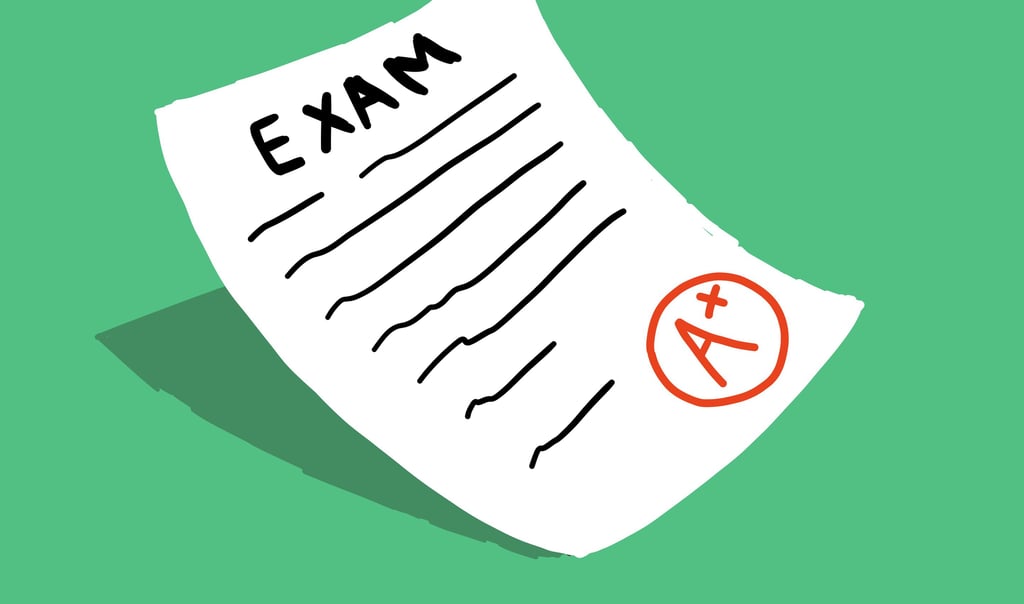Exam Preparation Tips Every Student Should Know!
Discover powerful exam preparation strategies to boost your performance in Cambridge exams. Learn practical study tips, mindset shifts, and time management techniques to walk into your exams with confidence.
STUDENTS
Achiever Tandoh
10/10/20259 min read


Exam Preparation Tips Every Student Should Know!
Exams. Just the word itself is enough to make many students feel nervous. The pressure to perform, the heavy workload, and the constant reminder that “these grades matter”, can turn exam season into one of the most stressful times of the year. Exam success isn’t obtained by cramming the night before or relying on luck. It’s obtained by having the right strategies, tools and habits that make your exam preparation more efficient, less overwhelming, and far more effective.
Think of exams like a big tournament. Athletes don’t just show up on match day and hope for the best. They prepare with training schedules, practice drills, mental focus, and recovery routines. Students need the same approach. With the right preparation strategies, exams stop feeling like a mountain you can’t climb and start looking like a challenge you’re ready to overcome.
In this guide, I’ll break down exam preparation strategies that actually work—not just for passing, but for excelling. Whether you’re preparing for your Cambridge IGCSE, AS, or A-Level exams, these strategies will help you build confidence, manage time properly, and walk into the exam room knowing you’ve done everything you can to succeed.
1. Start Early and Plan Smart


One of the most common bad habits students have is procrastination. They wait until the week (or worse, the night) before the exam to start studying. It’s easy to tell yourself “I’ll start tomorrow” until suddenly, tomorrow is exam day. Only then you begin to panic and spend the whole night trying to stuff in as much information into your head as possible, hoping that time could stop for a few hours.
The problem with cramming is simple: your brain can only hold so much information at once. When you try to squeeze weeks of learning into a single night, you end up stressed, sleep-deprived, and only half-prepared. Cramming rarely leads to deep understanding of the content.
The solution is simple. Start early. Ideally, revision should begin weeks or even months in advance, but don’t panic if you haven’t started yet, it’s never too late to create a smart plan.
Break your subjects down into smaller, manageable chunks. Instead of writing vague study goals like “revise algebra,” be specific: “revise quadratic equations,” “practice simultaneous equations,” or “review laws of indices.” This makes studying less overwhelming because you can actually see progress as you tick things off.
Create a study timetable that spreads topics out evenly. A detailed plan makes revision more achievable.
Recommended: Why Cramming is a Bad Study Habit and What to Do Instead
2. Focus on Understanding, Not Memorization


Here’s a big secret about exams: they’re designed to test whether you actually understand the concepts, not whether you can parrot formulas from memory. This is why memorization alone often fails—one small twist in the question and you’re left confused.
Many students try to memorise formulas, definitions, or solutions without really understanding them. The moment the exam twists the question slightly, they get stuck. That’s why they always complain about questions in exams being harder than class exercises and homework. When in fact what often makes exams feel more difficult is the unfamiliarity of the questions.
Instead of simply writing formulas over and over hoping to memorize them, dig deeper. Ask yourself:
Why does this formula work?
How does this concept connect to what I’ve already learned?
Can I explain this idea to someone else in plain, simple words?
For example, don’t just memorise the quadratic formula. Practice deriving it by completing the squares, understand why it works, and use it to solve different types of questions. When you know the “why,” the “how” becomes much easier.
Understanding gives you flexibility. Memorization is fragile, it cracks under pressure when the question doesn’t look exactly like the ones you studied. But when you understand, you can adapt. That’s the difference between scraping through and excelling.
3. Practice Past Papers Like They’re Real Exams


Cambridge exams are known for their style and format. If you want to succeed in Cambridge exams, there’s one strategy you cannot skip: using past papers. These papers are your best training ground because they show you exactly how questions are phrased, how marks are awarded, and what examiners expect.
When you do past papers, treat them like the real thing. Sit in a quiet place, time yourself strictly, and resist the urge to check notes halfway through. The goal is to simulate the real exam experience so nothing on exam day feels unfamiliar.
But don’t stop at just checking the mark scheme. Look at every mistake and ask yourself:
Was it a careless error, like missing a negative sign?
Did I run out of time and rush the last questions?
Or was it a genuine gap in my understanding of the topic?
For example, if you consistently lose marks on graph sketching, that’s a signal: you need to go back, revise functions, and practice graphing step by step.
The more past papers you complete, the more confident you’ll feel. Patterns begin to emerge, you’ll notice that Cambridge examiners love testing certain concepts again and again. Once you’ve practiced enough, the exam starts to feel less like a mystery and more like a familiar challenge.
Remember what I said earlier? Unfamiliarity is what makes exam questions feel much harder than they actually are. Past papers help you build familiarity with the type of question that appears in exams. Compared to someone who only uses textbook examples to study, you will be much more likely to do well if you use past papers correctly.
Recommended: How to Use Past Papers Correctly to Boost Your Grades
4. Practice Active Recall and Spaced Repetition


Reading your notes over and over again feels like studying, but it’s one of the least effective ways to study. Your brain tricks you into thinking you “know” the material simply because it looks familiar. But when the exam paper lands in front of you, that false confidence disappears.
That’s why active recall is the way to go. Instead of just passively rereading notes, you actively test your memory. After reading a certain section, close your book and ask yourself questions, try to recall what you just learned from memory. Write flashcards and quiz yourself. Cover up worked examples and try solving them without looking. Even better, explain the concept to a friend—or to yourself out loud—as though you’re the teacher. If you can explain it clearly, you really understand it.
Combine this with spaced repetition. Which simply means reviewing the same material at increasing time intervals. For example:
Study a new topic today.
Review it tomorrow.
Go over it again in three days.
Then a week later.
Then two weeks later.
Each time you revisit, your brain strengthens its memory of the material. This is how knowledge moves from short-term memory into long-term memory. Soon you will be able to answer questions on that topic a minute after waking up from sleep. People will begin to think you’re a genius.
5. Don’t Neglect Weak Areas


It’s tempting to keep revising the topics you already feel confident in. After all, solving questions you know how to do gives you a nice boost, it feels good to get them right. But here’s the catch: exams aren’t designed to test only what you’re comfortable with. They cover the full syllabus, and if you ignore your weak spots, those are the very questions that will cost you marks on exam day.
Instead, face your weak topics head-on. If trigonometry feels impossible, dedicate extra time to it. If statistics confuses you, break it down into smaller parts, and tackle them one by one. Remember: the topics you avoid now are the ones that will trip you up in the exam hall. You’d be surprised by how much you can boost your grades by simply leveling up your understanding of a single topic.
This is where working with a tutor makes a huge difference. At Chimhanda Tutoring, we help students pinpoint the exact areas they’re struggling with and break them down into simple, step-by-step explanations. Often, a concept that feels “impossible” clicks after it’s explained in a slightly different way.
6. Create a Healthy Study-Life Balance


A lot of students believe that the more hours they cram into revision, the better they’ll do. But the truth is that your brain is not a machine. After a certain point, forcing yourself to sit at your desk for hours on end becomes unproductive. You might look like you’re studying, but nothing is actually going in.
Balance is crucial.
Sleep: Aim for at least 6–8 hours. Sleep is when your brain consolidates what you’ve learned.
Exercise: Even a 20-minute walk improves focus and reduces anxiety.
Nutrition: Swap energy drinks for water and eat brain-friendly foods like eggs, nuts, fruits, and vegetables.
When you take care of your body, your mind performs better. Exam prep isn’t just about how many hours you study, it’s also about the quality of those hours. A well-rested, hydrated, and energised brain will always perform better than a tired, stressed one running on fast food and energy drinks.
7. Develop Exam-Day Strategies


Preparation doesn’t stop when revision ends. What you do on exam day can make or break your performance.
Revision gets you ready for the exam, but the way you handle yourself on the day is equally important. Imagine preparing for months, only to panic, make mistakes and waste marks when writing the paper That’s why having exam-day strategies is non-negotiable.
Here are some practical habits to adopt:
Arrive early so you’re calm and collected.
Read through the entire paper before answering to understand the spread of questions.
Manage your time: Don’t spend too long on one difficult question, move on and return later.
Show your working: Even if the final answer is wrong, Cambridge exams award marks for correct methods.
By having a plan, you prevent panic and maximise your chances of scoring well.
Recommended: Common Exam Mistakes And How to Avoid Them
8. Mindset Matters: Stay Positive


Exams are as much about mindset as they are about knowledge. The way you talk to yourself during revision and on exam day can massively affect your performance.
If you go into the exam hall thinking, “I’m going to fail, I don’t know enough,” your stress levels skyrocket, and your brain struggles to think clearly.
Instead, train yourself to think: “I’ve prepared. I know my stuff. If I stay calm and focused, I’ll do my best.” This shift in self-talk reduces anxiety and boosts performance.
When setbacks happen (like a bad practice paper), don’t take it as proof that you’re doomed and you’re going to fail. See it as feedback, it showed you what to improve before the real exam, which you did.
Final Thoughts
Exams don’t have to feel like a nightmare. With the right strategies—starting early, focusing on understanding, practicing past papers, using better study methods, tackling weak areas, and balancing studying with a healthy lifestyle—you can walk into the exam room prepared and confident and walk out knowing you did well.
Remember: success in Cambridge exams isn’t about luck. It’s about consistent, smart preparation. And if you ever feel stuck, know that you don’t have to do it alone.
At Chimhanda Tutoring, we help students transform their exam preparation with personalized strategies, expert guidance, and one-on-one support. Sign up to book a free trial lesson today and give yourself the best chance to shine this exam season.
You got this. We got you!









